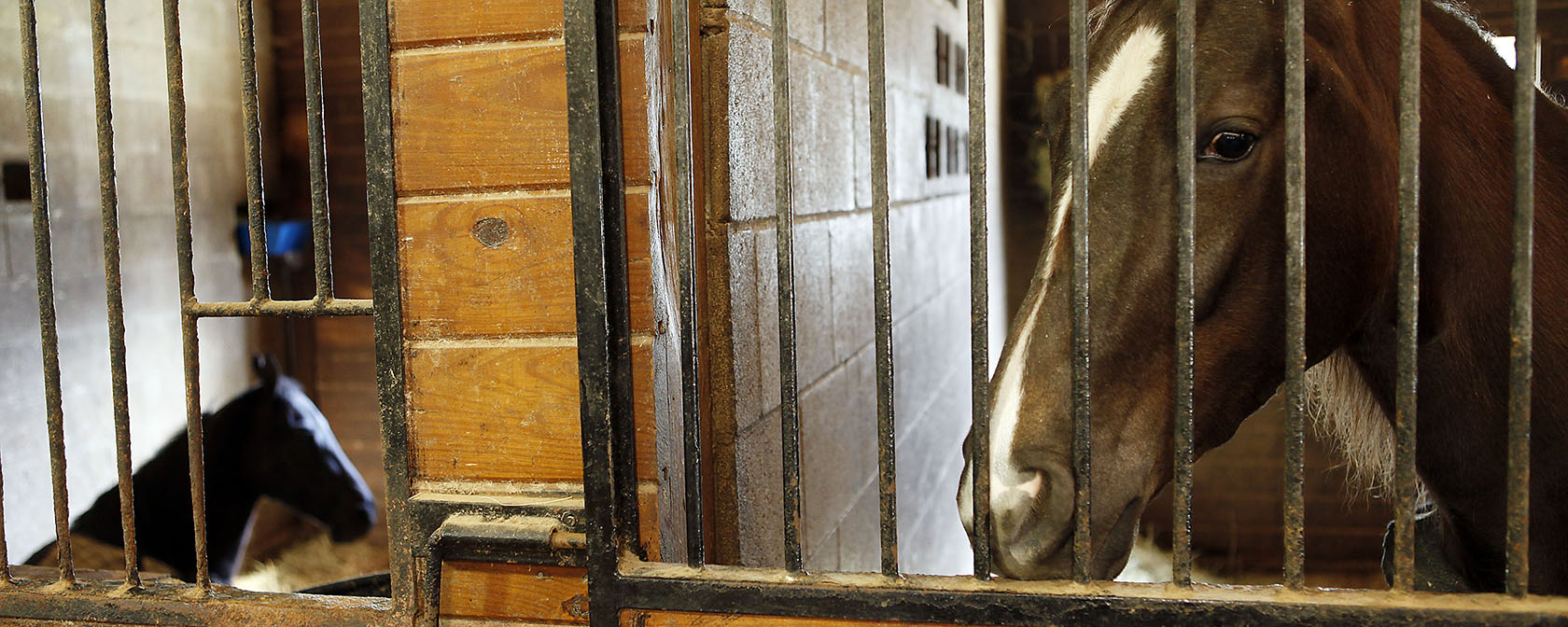The winning trainer/rider of the World Grand Championship class at this year’s Tennessee Walking Horse National Celebration, John Allen Callaway, recently served a federal disqualification for the “soring” of horses—a distinction also shared by his brother Bill and at least three other riders in the seven horse class. Together, they are the poster children for the Prevent All Soring Tactics (PAST) Act, H.R. 5441, reintroduced in the U.S. House of Representatives today with almost half the U.S. House of Representatives already onboard. Its passage would bring an immediate end to their covert cruelties and bring much needed relief to the Tennessee walking horse and related breeds subjected to this awful practice, in which trainers use caustic chemicals, chains, weights, sharp objects, cutting and other gruesome techniques to produce an artificially high-stepping gait known as the “big lick” that wins prizes at some horse shows.
Reps. Steve Cohen (D-Tenn.), Brian Fitzpatrick (R-Pa.), Jan Schakowsky (D-Ill.), and Vern Buchanan (R-Fl.) are the lead sponsors, with 209 other original cosponsors backing this widely popular bill to strengthen the federal Horse Protection Act of 1970 so it more effectively targets the wanton cruelty of soring perpetuated by the big lick faction of the Tennessee walking horse universe. Sens. Mike Crapo (R-Idaho) and Mark Warner (D-Va.) introduced the parallel Senate bill, S. 2295, in June with 46 other original cosponsors.
"... [t]he practice of soring has marred the Tennessee Walking Horse and related breeds for more than six decades. I am proud to reintroduce the PAST Act to finally eradicate this indefensible practice and show that Americans will treat animals humanely." - Rep. Steve Cohen
The PAST Act passed the House in the 116th Congress by a wide bipartisan margin of 333-96, largely on the strength of the evidence of cruelty in the training of the horses. Top-winning trainers of big lick horses have histories of citations for violating the HPA, including 13 of the 15 current members of the Walking Horse Trainers Association board. Three of those (Bill Cantrell, Herbert Derickson and Brad Beard) are currently on lengthy federal disqualifications meant to prevent them from showing, owning, training or otherwise participating in horse shows, and the other ten have previously served USDA and/or industry disqualifications for alleged violations of the law.
As demonstrated by undercover investigations, for those seeking the big lick gait, in order to compete, you have to cheat—and inflict horrific pain on your equine victims. Jackie McConnell (the West Tennessee Hall of Fame trainer whose brutality we exposed and who was ultimately convicted in 2012 on felony charges) was initially shunned by his industry, but was recently spotted at the Celebration, despite the board’s previous decision to ban him from the showgrounds for life—and was even a sponsor of one of its 2021 championship trophies.
Our analysis of data provided by USDA on the rate of HPA violations and detection by agency veterinarians vs. industry inspectors (many of whom have conflicts of interest) fleshes out the indictment of cruelty. During the years 2018 to 2020, on average:
- The violation rate concerning stacked and/or chained horses (a specific target of PAST) was 11.25% at shows USDA personnel attended, compared to only .53% for flat shod horses (i.e., those without stacks or chains). The number of horses inspected in each category was nearly the same.
- USDA veterinarians detected violations at a rate 403% higher than industry inspectors.
- Industry inspectors detected violations at a rate 606% higher at the very few shows USDA veterinarians attended than when those officials were not present.
The dirty secret of the field is this: soring is the process used to produce the big lick gait rewarded by judges who are themselves often cited for violating the federal law. And an end to soring will bring Tennessee walking horses the relief they deserve.
PAST seeks to amend the HPA by abolishing the failed system of industry self-policing (and returning oversight over all inspectors to USDA), banning the use of devices that are an integral component of soring, making the act of soring itself illegal and increasing penalties to provide meaningful deterrents.
The bill is endorsed by leading groups in the horse industry and veterinary, law enforcement and animal protection communities, and we’re calling on legislators in the House and Senate to cosponsor PAST if they haven’t already done so. We’re also urging Speaker Nancy Pelosi, Majority Leader Chuck Schumer and Minority Leader Mitch McConnell to get this bill over the finish line this Congress.
Secretary of Agriculture Tom Vilsack could put us on an even faster track to success if he would simply reinstate a 2017 USDA rule amending his agency’s Horse Protection regulations to help end soring. That rule, which attracted over 100,000 supportive public comments and sweeping bipartisan congressional support, was finalized during his first tenure as Secretary during the closing days of the last administration but never implemented. The ongoing use of devices integral to soring and failure of industry self-inspection programs—the very conditions that drove that rule forward—are as awful today as they were four years ago, as the USDA’s own data makes clear. The Secretary should instruct his agency to move swiftly to publish the rule in the Federal Register and implement it before another show season begins next year—to spare thousands of horses from unspeakable suffering.
Whether by administrative rule or enactment of the PAST Act to prohibit this hidden cruelty that causes so much suffering and so badly tarnishes our relationship with the Tennessee walking horse, we want to end soring forever. And with your help, we can do it.




